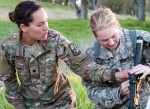Cheska Molina is known for being one of the fastest runners in UCLA’s ROTC battalion.
Cheska Molina, a first-year human biology and society student, and her twin Charina Molina, who is also in the ROTC program at UCLA and a human biology and society student, were even part of the UCLA Ranger Challenge team, which comprises eight to 10 of the fittest cadets in UCLA’s 92-person Army ROTC battalion.
The Ranger Challenge serves as an opportunity for cadets to learn new skills such as building a rope bridge, crossing a grenade assault course and hiking up a four-mile-long hill with rucksacks. UCLA’s Ranger Challenge team trains for two months and competes against other ROTC battalions across the country.
Although women have always been able to participate in the Ranger Challenge, they were not allowed to join combat branches of the Army, such as infantry, armor and the special forces, until recently. The U.S. military initially announced it would be integrating women into combat arms in 2013, and the UCLA battalion commissioned its first female infantry officer in December 2016.
Nearly a year and a half later, multiple women from the UCLA battalion started participating in the Ranger Challenge each year, and 17 women out of the total 84 cadets participated in the army Field Training Exercise, a three-day intensive program in which cadets practice the skills they have learned over several months on a military base, earlier this month.
For third-year cadets, who are about to be selected for different branches of the military after a final evaluation over the summer, the spring FTX is equivalent to an “army midterm” said Maj. Tyrone Vargas, an assistant professor of military science at UCLA.
Lt. Col. Shannon Stambersky, professor of military science at UCLA and a leader at UCLA’s ROTC battalion, said there are more opportunities for women in the military following the 2013 decision to integrate women into combat roles.
“Women now see that there are no doors closed to them and that anything is possible,” she said.
Cheska Molina said that, even though she is a woman and underclassman, she feels she receives the same amount of support ROTC program as her male and upperclassmen counterparts.
“A lot of my close friends are in ROTC,” she said. “The camaraderie that comes out of it is really cool and inspiring.”
Hannah Holden, a third-year applied linguistics major, said being a woman does not deter her from being a successful member of ROTC, because her fellow cadets believe in her abilities.
“I will throw any of my guy friends onto my back if I need to,” she said. “There’s never any doubt of competence as a leader, as a soldier or as a teammate.”
Holden, who co-captains the UCLA Ranger Challenge team, said that, despite the Molina twins’ petite stature, the team respects their abilities.
Ashley Fairbanks, a fourth-year communication student, said that, although the army is far from being fully integrated by gender, she thinks it has little effect on the women in ROTC.
“(Does it affect me) in the amount of restrooms?” she said. “Yes, but, as long as you perform, you’re going to be OK.”
Fairbanks said she thinks fewer women enter the military because they are often raised with fewer role models, such as superheroes and action figures, who fight.
“I think less women are interested in the military because girls aren’t given the opportunity growing up to play soldier,” Fairbanks said. “It’s not called GI Jane; it’s called GI Joe.”
Edwin Chang, a fourth-year geography student, said that, when women are allowed to do something, such as join combat arms branches, they often prove they can perform better than their male counterparts in physical training, military science classes and completing missions.
“When women do their thing, you know that they’re in the game and they’ll do something way better than a lot of guys,” he said.
Stambersky said she thinks the women in UCLA’s battalion demonstrate not only intelligence and fitness, but also grit and determination.
“I am proud that I have been able to be part of a team of cadre that fostered an environment where our cadets learned to respect each other,” she said. “They will be a new generation of officers that I hope take these experiences with them and learn to never set limits on themselves or their subordinates.”
